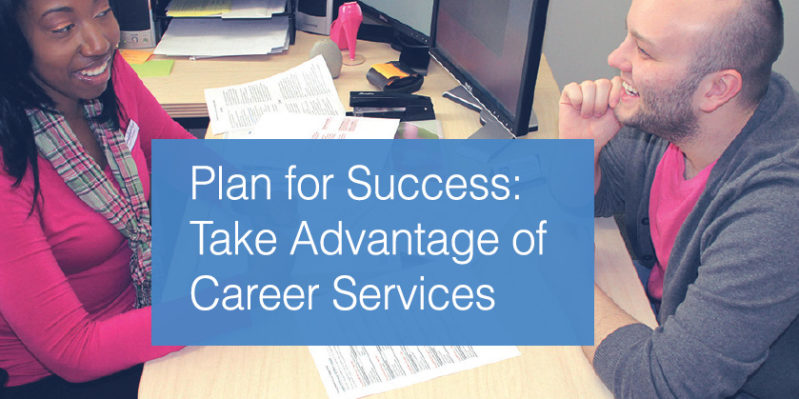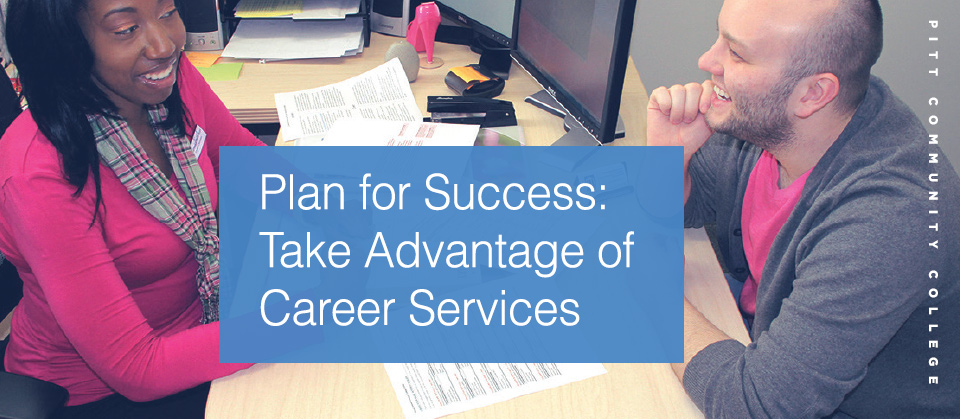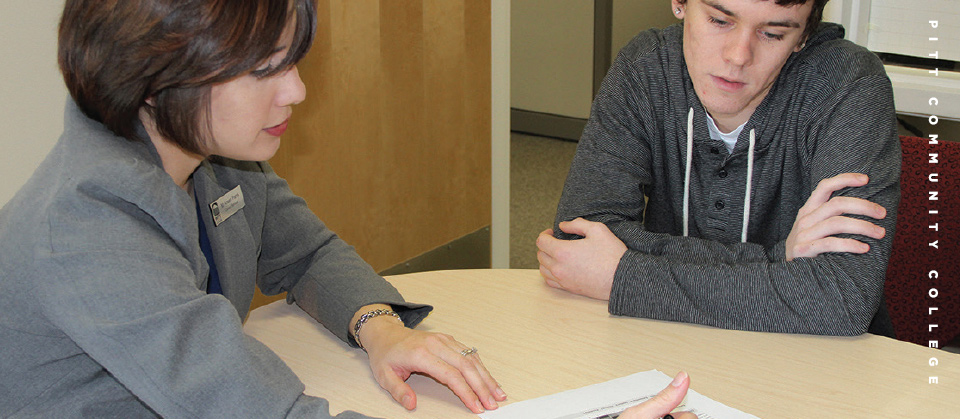

Beginning a career isn’t always as simple as graduating from college and landing a job. Planning for a career requires that we take a look within ourselves, explore career options, and conduct a strategic job search. Like most things worth having in life, it requires hard work and planning. The Career Services office at Pitt Community College assists students and alumni with navigating the career planning process.
Self-Assessment
Students often enroll in college figuring that they will determine their major and/or career goal along the way. While this may occur, it can cause them to spend a longer time in college and be unsure of their future careers. By assessing their interests, values, personality and skills, students will be better equipped to make decisions about their career goals and set educational paths that will lead them to achieving their goals.
The PCC Career Services office utilizes the following online self-assessments to help students better understand themselves and identify careers that are in alignment with who they are:
Myers-Briggs Type Indicator (MBTI)
The MBTI is a personality assessment that looks at who you are as a person and how it can impact your career choices. The assessment details how you interact with others, make decisions, and take in information. It is based on the theory that understanding your personal preferences will help you identify the types of careers that will play towards your strengths and be fulfilling.
Strong Interest Inventory (SII)
The Strong Interest Inventory assesses your interests and is based on the theory that people are more satisfied working in jobs that they find interesting and with people who share similar interests. The Strong also provides information on how your interests can be linked to majors and generates a list of possible occupations.
Other assessments available through the Career Services office include the Career Thoughts Inventory, which takes a look at an individual’s career problem-solving and decision-making skills and tendencies, and the Life Values Inventory, which assists with defining and prioritizing each participant’s values system.
Career Exploration
Once potentially fulfilling careers have been identified, the next step in planning is to explore each of the paths. Career exploration involves researching an occupation’s outlook, current trends in the labor market, the necessary education and training, and whether it will provide for you financially based on the lifestyle that you seek.
Much of the research may be done online, and Career Services teaches students and alumni which resources are most beneficial and how to use them. The Career Services office recommends the following websites:
O*Net Online
Sponsored by the United States Department of Labor, O*Net Online offers profiles for more than 900 occupations. Each profile includes an occupational summary and details of the necessary skills, abilities, knowledge, tasks, work activities, work context, experience levels required, job interests, work values, and styles. The profile also includes a Job Zone section, which will tell you how much education, experience, and on-the-job-training is required to perform the occupation.
CareerOnestop
A link to CareerOnestop is provided toward the end of an O*Net report, or you may visit the website by conducting an independent search. CareerOnestop is also sponsored by the United States Department of Labor, and you can set an occupational profile search to a specific state. The profile will include a table comparing the occupation’s state wages and employment trends to the national averages. The information may help you determine whether an occupation’s employment and pay rate is strong in your state or whether you may need to consider relocation.
Occupational Outlook Handbook
Sponsored by the Bureau of Labor Statistics (BLS), the Occupational Outlook Handbook (OOH) profiles hundreds of occupations and breaks the information down into sections such as Summary, What They Do, Work Environment, How to Become One (which includes educational and training requirements), Pay, and Similar Occupations. Each profile also includes BLS employment projections for the 2010–20 decade. The OOH is also available in print form and may be available at your local library. Many students find the language in OOH occupation profiles more accessible than its counterparts.
Informational Interviews
While the websites will provide you with the data necessary to help you make an informed decision, nothing will be as beneficial as learning about the career from someone working in the field. Career Services encourages students and alumni to conduct informational interviews – one of the most under-utilized career exploration tools.
One of the best ways to learn about a career is to talk with someone working in it. An informational interview is when you interview someone working in your career of interest. The goal of the interview is to obtain information about your desired career. During the interview, you will receive first-hand information about the realities of the career, how to break into it, and its associated occupations. The information will either challenge or confirm your career decision. The interviews should be brief, lasting 20-30 minutes, and ideally conducted in person.
The Job Search
Now that you have identified a career and the occupations within it that are of the most interest to you, it is time to begin the search for a job. The job search process includes creating a resume, completing job applications, networking, and interviewing. Since this process can be overwhelming and daunting, the Career Services office assists students and alumni with each part and helps them create a plan to strategically and efficiently search for jobs.
Resumes
Students often ask the Career Services office if their resume is “good.” Resumes are more a matter of effective versus ineffective. How do you know if your resume is effective? You will know if it secures an interview for you. An effective resume secures an interview because it shows the employer that you meet (or exceed) the qualifications for the job, generates further interest in you, and highlights why you are the best candidate. To do so, your resume needs to be tailored to each job you apply for; you should submit a different resume for each job application.
An ineffective job search is when the seeker utilizes the same resume to apply for multiple jobs. When completing online applications, have your resume available, as it will assist you tailoring the application to the specific job. Your resume is a living document and should be constantly updated as you gain new experiences and develop new skills. The PCC Career Services office helps students and alumni create resumes that effectively market the individual.
Networking
In a National Public Radio online article, Matt Youngquist, president of Career Horizons, said, “Most jobs aren’t posted or advertised publicly. At least 70 percent, if not 80 percent, of jobs are not published. … And yet most people — they are spending 70 to 80 percent of their time surfing the net versus getting out there, talking to employers, taking some chances, (and) realizing that the vast majority of hiring is friends and acquaintances hiring other trusted friends and acquaintances.” Youngquist was referring to the most effective job search tool, networking.
Networking is an ongoing process of establishing and cultivating relationships with people who can assist you in your job search and beyond. Networking is not about asking people for a job – it’s about gathering information, sharing leads, and providing referrals. The Career Services office recommends creating a spreadsheet to help you identify and keep track of your network. The spreadsheet should include contact information for those in your network, potential referrals, and the dates and means for when contact has been made with the individuals. The more you know about the backgrounds of those in your network, the more a discussion can lead to an opportunity. Networking is not just for those looking for a job. Once you’ve landed a job, you should continue to further your career connections, keep abreast of its current trends, and be open to new opportunities.
Interviewing
The interview is your chance to market your skills and attributes to the employer. You need to communicate to the employer why you are the best candidate for the job. In order to do so effectively, you must understand the need that the employer is trying to fill. Prepare for the interview by researching the employer extensively and use the information to develop pertinent questions to ask at the interview. After the interview, write thank you letters immediately because it will help you stand out from the rest. Evaluate your performance by making notes on the questions that you answered well and those that you may need to improve upon next time. PCC’s Career Services office helps students and alumni strengthen their interviewing skills by conducting mock (practice) interviews and discussing the do’s and don’ts of a professional job interview.
Career planning is a cyclical process. As you are exposed to new experiences and develop new skills, you should check in with yourself to identify shifts in your interests, values, and professional goals. This might cause you to explore new career options and ultimately make a change in your career. Whether you are a current curriculum student or alumnus, the PCC Career Services office can help you navigate the career planning process.
Pitt Community College Career Services
Craig F. Goess Student Center,
Rooms 117 & 118
252.493.7245
[email protected]
Visit the PCC Career Services webpage.

